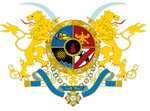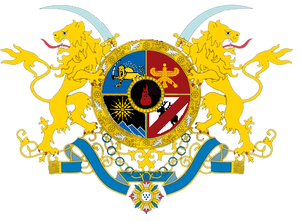Ichirō
| 一郎 Ichirō Ayreon-Kalirion ibn al-Majeed al-Osman bin Sathrati of Waffel-Paine | |
 | |
| Former Senator of the Lakes | |
|---|---|
 | |
| Tenure began | 1.I.1713 AN |
| Tenure ended | 35.XV.1730 AN (17 AN years |
| Senatorial positions | Commander of the Order of the Holy Lakes |
| Senate(s) | X, XI, XII |
| Elected | 1712 |
| Faction | United |
| Order of the Holy Lakes | Andelarion, Osman, Tahmaseb, Arviður, Daniel Kalirion, Waffel-Paine, Elijah Ayreon |
| Physical description | |
| Gender | Male |
| Species | Human |
| Biographical information | |
| Father | Prince Kir of Shireroth and Whales |
| Mother | Kataoka Yukiji |
| Spouse(s) | Kaika bat Gyoku |
| Children |
Yukio Sechigu Sehoshi |
| Date of birth | 7.XI.1693 |
| Place of birth |
|
| Date of death | 35.XV.1730 (aged 37 AN years) |
| Place of death |
Upper Lywall ( |
Ichirō Ayreon-Kalirion ibn al-Majeed al-Osman bin Sathrati of Waffel-Paine was a Shirerithian–Natopian–Hurmu nobleman and politician, as well as a member of the Imperial Family of Shireroth.
Biography
Birth and childhood
He was born in the small Kataoka fishermen's cottage in Kigazeki. While the son of Prince Kir, at the time of the little boy's birth, his parents were temporarily estranged due to events in Shirekeep. The boy was registered in the civil records as Kataoka Ichirō after his mother's maiden name (as she was not publicly known, not even to her family, of her married status). Upon the boy's parents' reconciliation two weeks later, the records were corrected. A given name cannot be changed, despite Kir's belief that "Ichirō" was an unsuitable name for a member of the House of Ayreon-Kalirion, he relented after a while. He gave himself and his new family a shortened version of his surname, "Ayreon-Kalirion of Waffel-Paine" signifying only the two major components of it. For a Sangunese family, this shortened surname, however, was still considered preposterously long. The surname is not actually used very often.
In 1695, his mother gave birth to a brother, Jirō, and, in 1697, a sister, Enhei.
In 1698, he was, along with his siblings, granted the title Prince of Shireroth by his aunt Kaiseress Salome.
In 1703, his father died, and Ichirō inherited the sovereignty over Varmland. At the same time, he relocated to Shireroth. In 1706, his mother committed seppuku. He is since become the foster child, along with his siblings, of Mondo and Anastasia.
Adulthood, relocation to Hurmu
Upon reaching adulthood on his 18th birthday, he declared that he would restore his surname to the ancestral one, Ayreon-Kalirion ibn al-Majeed al-Osman bin Sathrati of Waffel-Paine (his father had previously shortened it to "Ayreon-Kalirion of Waffel-Paine"). When the 1712 Hurmu general elections were announced, he declared he would stand for Senate, to keep on his father's work.
In 1712, he was elected to the Senate of the Lakes and after the Senate's inauguration in 1713, he was elected Commander of the Order of the Holy Lakes. At this time, he met with Clarissa Isabella des Vinandy, daughter of Hendrik Leopold des Vinandy, the Duke of Gascony. The two took a liking to each other, falling in love. The two wanted to marry one another. They had hoped that with the normalization of relations between the House of Vinandy and the Imperial House of Shireroth, it would be possible. They had even prepared a marriage contract. In the end, however, the Kaiseress declined to approve the marriage, giving no reason to it. Ichirō interpreted it having to do with Clarissa having Haraldite blood. Although disappointed, he accepted the Kaiseress's decision, and broke off his relation with Clarissa.
Marriage
Thereafter, the Steward of Shireroth, Chrysostom Wythe, Count of Woodshire, took it upon himself to find a more suitable bride for Ichirō. He sought out his former counterpart in Jingdao, Hon ben Gyoku, to find a suitable match. They agreed on a set of criteria of the future wife: She had to have good pedigree, no Haraldite blood, and be in a good physical shape and age so to be able to produce children. After much searching, Hon ben Gyoku realized that the best match for Ichirō was his own granddaughter Kaika bat Gyoku. Without having met one another, both Ichirō and Kaika were persuaded to join one another in marriage, and they signed a petition, already drafted by Lord Woodshire and Hon ben Gyoku, addressed to the Kaiseress to be allowed to join another in marriage. On 17.14.1714, the Kaiseress responded by issuing a decree allowing Ichirō to "plight his troth" to Kaika.
On 1.I.1715, Ichirō married Kaika in a lavish ceremony in Daocheng. A year and 12 days later, on 13.I.1716, Kaika gave birth to a son, Yukio. She gave birth to a second son, Sechigu, on 6.V.1719, and a daughter, Sehoshi, on 5.XII.1722.
New Charter in Hurmu
Ichirō was re-elected to the Eleventh Senate, and, in the Senate, re-elected once more to the position of Commander of the Order of the Holy Lakes. He drafted the new Charter for the Order of the Holy Lakes, which, with minor revisions, was approved by the Senate on 17.XIII.1720, and became the new constitution for Hurmu. In mid-1727, he oversaw negotiations with Phineonesia on the possibility of a Phineonesian accession as realms of the Order of the Holy Lakes.
Elected one of three members of the Board of Directors of the Transegale Trading Company on 13.V.1724.
Shirerithian regency crisis 1727
Due to his ties with some influential noble families in Greater Kildare, he received large support among the nobility of the Eastern Imperium during the 1727 Shirerithian regency crisis. He began a low-level campaigning for the position of Regent by midsummer 1727, going to various meetings and lobbying for the position among members of the Landsraad and Adelsraad, particularly those from Kildare, but also other people who shared his antipathy towards humanism.
On a visit to the Chrysantium House in Shirekeep on 4.X.1727, he proved his Jing qualities to the acclaim of the nobles there having tea with him. He showed off his calligraphy skills by writing his mother's dying words, 謹記彼等殺之 ("remember that they had him killed"). Commenters noted that his penmanship was perfectly fine, though it did not advance the art of calligraphy further (which was to be expected, he was not known to be a calligrapher after all). Ichirō then held a rousing speech, speaking of how Kildare has always been free of humanism, and that the best way to counter humanism in Shireroth is to have him – a Kildarian by marriage, a survivor of humanist brutality himself – as Regent. That way, Shireroth could survive and regain itself, and grow to be the dominant power on both Apollonia and Benacia again. If we remained unwavering toward humanism, like in Hurmu, others will wish to join for protection. He ended his speech, thus: "with strong Ayreonism with Jing characteristics, the Radiant Sun shining forth the heavenly light, will come to illuminate all of the Benacian continent, bringing an end to the darkness that humanism always brings." His speech was received with standing ovations.
In the Landsraad, there was a motion, proposed by all Kildarian–Jing nobles, to make Ichirō regent. At the time, there were competing bills also present – one to confirm Rubin as regent, one to make Daniyal Aurangzeb Kalirion-Osman, the Count of Erudition, regent, while the Laqi delegation refused to speak to anyone outside on the matter. The Prætor felt that no bill had enough support to gain a majority, so he bid his time.
Jaaguzan's death, Phineonesian Accession Treaty
On the spur of the moment, perhaps because he felt extra connected to his mother at this time, he decided to take his wife and children to his late mother's estate in Engita on the Guttulian coast. He hoped that he could connect his children with his mother, whom they never had met, and understand her passion and why she had killed herself to warn against humanism. However, this plan was derailed before it could commence, as meanwhile in Çakaristan, on 9.X.1727, the Shahanshah (in Shireroth, the Duke of Brandenburg in the Landsraad) was found murdered, forcing the Landsraad instead to debate motions of grief, sorrow and support to the Çakaristani people. As the Shahanshah–Duke was a peer of the imperial realm, certain rituals had to be carried out.
Ichirō, as commander of the Order of the Holy Lakes, had to return to Huyenkula. The Senate was called into immediate session to debate the murder, and a motion was prepared for immediate expression of condolences and sympathies. Hurmu entered a period of national sorrow, during which Ichirō felt it would be bad form to campaign. After the 12 days of national grief, Ichirō steered the ratification of the Phineonesian Accession Treaty through the Senate. On 6.XII.1727, the Senate ratified it. The very next day, Ichirō and his family left for Engita for a holiday there.
Engita incident
The holiday at Engita would subsequently prove to be an extended retreat from the concerns of the world. The atmosphere in Shirekeep had turned poisonous and it was felt expedient for Ichirō to absent himself from the Landsraad whilst his Kildari partisans engaged in the necessary politicking there, as well as at court, and amongst the peers of the Adelsraad. Being seen to remain apart from the fray would help to preserve Ichirō's essential dignity and avoid the promotion of damaging rumours concerning a rift between himself and Prince Rubin, which Ichirō hoped was indeed something that could be averted. Nonetheless, the commencement of the twelfth session of the Senate in Hurmu would necessitate his presence, and as such, the date of 1.I.1728 AN was chosen for his departure from Engita to Gate Rumsɬæn-Maltenstein for the onward journey to Huyenkula. It would however prove to be a fateful day.
Death
See: Journey to the West
Honors and Awards
Style and Titles
- Style: His Serenity (Shirerithian); His Imperial Highness (traditional)
- Titles: Viscount Audon of Varmland, Prince of Shireroth, Lord in Kigazeki, Lord in Jorvik, Progeny of the Once-Living God, Knight of the Holy Lakes, Scion of the King of Kings
He was the heir presumptive to the Duchy of New Aquitane, the Rājatba of Tas Neemia and the titles of Prince of Hurmu and Prince among the Lakes.
| Ancestors of Ichirō | ||||||||||||||||||||||||||||||||||||||||||||||||||||||||||||||||||||||||||||||||||||||||||||||||||||||||||||||||||||||||||||||||||||||||||||||||||||||||||||||||||||||||||||||||||||||||||||||||||||||||||||||
|---|---|---|---|---|---|---|---|---|---|---|---|---|---|---|---|---|---|---|---|---|---|---|---|---|---|---|---|---|---|---|---|---|---|---|---|---|---|---|---|---|---|---|---|---|---|---|---|---|---|---|---|---|---|---|---|---|---|---|---|---|---|---|---|---|---|---|---|---|---|---|---|---|---|---|---|---|---|---|---|---|---|---|---|---|---|---|---|---|---|---|---|---|---|---|---|---|---|---|---|---|---|---|---|---|---|---|---|---|---|---|---|---|---|---|---|---|---|---|---|---|---|---|---|---|---|---|---|---|---|---|---|---|---|---|---|---|---|---|---|---|---|---|---|---|---|---|---|---|---|---|---|---|---|---|---|---|---|---|---|---|---|---|---|---|---|---|---|---|---|---|---|---|---|---|---|---|---|---|---|---|---|---|---|---|---|---|---|---|---|---|---|---|---|---|---|---|---|---|---|---|---|---|---|---|---|---|
| ||||||||||||||||||||||||||||||||||||||||||||||||||||||||||||||||||||||||||||||||||||||||||||||||||||||||||||||||||||||||||||||||||||||||||||||||||||||||||||||||||||||||||||||||||||||||||||||||||||||||||||||
| Preceded by: Patrik Djupvik |
Commander of the Order of the Holy Lakes 1713–1728 |
Succeeded by Marcus Avon-El Myksos |

